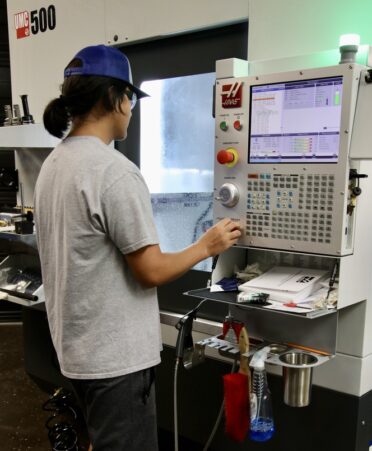(MARSHALL, Texas) – Few people know that multiple machines all over the world are used to create each of their cellphone’s components, along with nearly everything else that society uses. But those machines cannot do the job alone, and that is where machinists come in.
“Everything you interact with every day would not exist if it weren’t for a machinist,” said Nathan Cleveland, associate provost at Texas State Technical College’s Marshall campus.
TSTC’s Precision Machining Technology program teaches students to design and manufacture parts of machinery by using blueprints, codes and the program’s various hands-on machines. Students are trained on machines similar to those used in industries in which they might work, including the medical, manufacturing and technical industries.
Lead instructor Daniel Nixon is no stranger to the field of machining, with 14 years of experience as a machinist and 16 years of teaching at TSTC under his belt. With many of Texas’ experienced machinists reaching retirement age, Nixon’s mission is to train their replacements.
“If we don’t have people coming into the machining trade, we’re going to end up crippling manufacturing,” Nixon said. “Machinists play a huge role in manufacturing, but also a huge role in the U.S. economy. If we lost all of our machinists today to retirement, we could cripple this country.”
While it is a common assumption that a student needs to have some kind of experience in the college program of their choice before pursuing their degree, Precision Machining Technology is different.
Cleveland himself is a TSTC graduate with more than a decade of experience in Precision Machining Technology. He emphasized that prospective students do not need to know anything about the machining process to join the program.
“We assume when you walk in the door, you come in knowing nothing, right down to how to read a tape measure,” Cleveland said. “We teach everything from 2D lathe work up to five-axis machining. It’s pretty comprehensive.”
Nixon’s goal is to see 10 to 20 new students enrolled for the fall semester. For those who need help paying for tuition, Nixon recommends looking into scholarships offered by the Gene Haas Foundation, which manufactured many of the machines that the program uses to train its students. TSTC itself also offers a wide range of scholarships.
TSTC student Toby Toney grew up admiring his stepfather’s welding career. Now his ultimate goal is one day to open a shop where he can use his newfound education to manufacture parts for customers or help them design their own.
“(The TSTC instructors) have been so helpful, knowledgeable,” Toney said. “I’ve been able to talk to my teachers on a one-on-one basis. There’s no intimidation coming here. We’re all family.”
Toney will graduate from the Precision Machining Technology program on Aug. 29 before beginning TSTC’s Drafting and Design program.
According to onetonline.org, CNC (computer numerical control) tool programmers earn an average of $61,740 per year in Texas, where the number of such jobs was projected to increase 47% from 2020 to 2030.
TSTC offers an Associate of Applied Science degree and a certificate of completion in Precision Machining Technology, as well as a certificate of completion in Machining, at its East Williamson County, Fort Bend County, Harlingen, Marshall, North Texas and Waco campuses.
Precision Machining Technology is one of nine programs at TSTC that have money-back guarantees. The college’s commitment to participating students is simple: If they do not have a job in their field within six months of graduation, they will receive a full refund of their tuition. For more information, visit tstc.edu/mbg.
Registration for TSTC’s fall semester is underway. For more information, visit tstc.edu.
